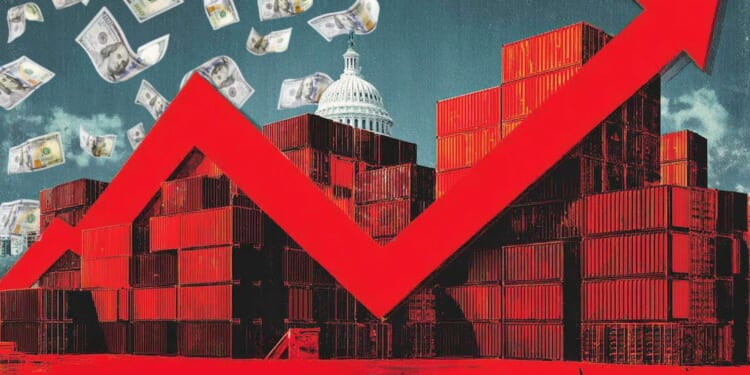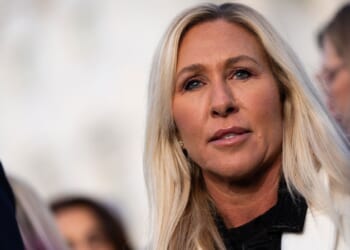Tariffs on foreign imports have been a consistent theme of President Donald Trump’s terms in office; he even says tariff is “the most beautiful word in the dictionary.” But despite his consistent claims to the contrary, tariffs are taxes borne by American consumers, as a new study confirms.
A working paper out this month from the National Board of Economic Research (NBER)—conducted by researchers from Duke University, the University of Chicago, and the Federal Reserve Board of Governors—seeks to understand what portion of tariffs American consumers actually bear through higher prices.
The authors note that after tariff increases in Trump’s first term, “a wide range of studies” reached different conclusions on when and how tariffs “pass through” and increase the cost of an imported product. “This paper seeks to resolve this disconnect by tracing the tariff impact on prices of an imported product throughout its journey from the foreign producer—via the importer, wholesaler, and retailer—to the final consumer.”
The study “examines the effects of tariffs along the supply chain using product-level data from a large U.S. wine importer in the context of the 2019-2021 U.S. tariffs on European wines.” In October 2019, during his first presidential administration, Trump imposed 25-percent tariffs on a variety of European food products, including French wine.
The NBER report found these duties were a bad deal in multiple ways. For one thing, “in an example of tariff engineering, products switched their alcohol content to avoid the tariffs, and new products were introduced that were not subject to the tariffs,” the authors found.
For products still subject to tariffs, the report adds that even when prices don’t go up by the full amount of the tariff, “we find that it is possible that domestic consumers fully pay for these costs.” This is because although “foreign producers partially absorb the tariff by lowering their prices” and “domestic importers only pass about a 5% price increase (out of the 25% tariff) to their distributors,” it turns out “markups actually expand between distributors and final consumers: despite an additional stage of markups, prices increase to the consumer by close to 7 percent relative to before tariffs were imposed.”
It turns out the tariffs were a bad deal both for consumers and the government. “Our estimates indicate that U.S. consumers paid more than the government received in tariff revenue, because domestic markups amplified downstream price effects,” the authors note. “Despite a significantly smaller percent increase in prices than the percent applied in new tariffs, multiple markups resulted in the dollar increase in what consumers paid ($1.59 per bottle, in our example) that was ultimately greater than the increase in tariff revenue ($1.19 per bottle).”
As a result of tariffs, consumers pay more in higher prices than the government collects in additional revenue, and distributors and retailers see the rest in higher profit margins, while producers who make the product actually see lower margins.
Throughout the 2024 campaign, Trump repeatedly said other countries would pay higher tariffs, not Americans.
“A tariff is a tax on a foreign country. That’s the way it is, whether you like it or not,” Trump said at a campaign rally in August 2024. “A lot of people like to say it’s a tax on us. No, no, no. It’s a tax on a foreign country.” This was his position throughout his first term, saying in September 2018, “China is now paying us billions of dollars in tariffs.”
This is simply wrong, and at times, Trump has even seemed to admit it. In May 2025, when Walmart suggested it may raise prices in response to tariffs on China, Trump threatened that the retail giant “should, as is said, ‘EAT THE TARIFFS,’ and not charge valued customers ANYTHING.” If foreign countries truly paid tariffs, there would be nothing for Walmart to “eat.”
The NBER report only focused on one product category during Trump’s first term, but its findings are consistent with many other studies. “Going back to the last episode with rising tariffs in 2018, research showed that the cost of the tariffs was almost entirely passed through onto domestic prices,” the Federal Reserve Bank of Atlanta wrote in June, noting that according to its research, most companies surveyed “anticipate sacrificing demand should they choose to fully pass a tariff-related cost increase on to customers.”
It also affirms what consumers can plainly see. “Eight months into President Trump’s latest trade war,” writes Alex Durante of the Tax Foundation, “the evidence shows that tariffs have raised overall retail prices by about 4.9 percentage points relative to the pre-tariff trend.”
















